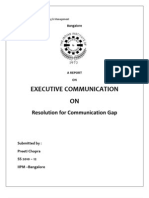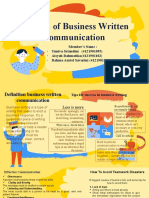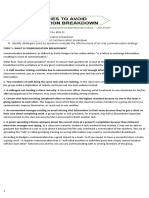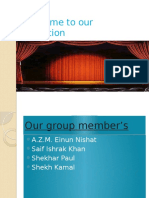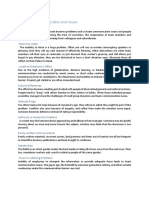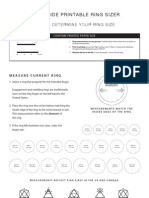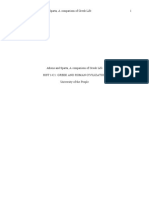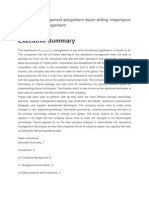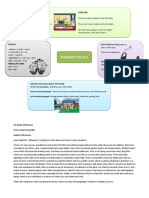Lesson 10
Communication for Work Purposes
Module 10-Week 10
Hello, my dear students!
There are different modes of communication across professions. Knowing
the difference between these communication materials is an essential skill
needed in your future workplace.
To know what are these communication materials, dig in, and enjoy the
rest of the module! 😊
LEARNING OUTCOMES
At the end of this module, you should be able to:
✓ Identify the various genres used across professions;
✓ Discuss the importance of oral communication skills in the workplace.
✓ Describe the pressing challenges encountered by business communicators.
✓ Expound on the fundamentals of online interviews.
✓ Show understanding of the structure of multiple genres used across occupations; and
✓ Show the ability to communicate through independent and group communicative learning
activities
1. How do communication materials differ in format from those that are written or prepared
traditionally?
Oral Communication in the Workplace
Your activity in the company or organization that you will be part of in the future involves a lot
of oral communication. More often than not, your daily tasks require effective communication. Hence,
your good communication skill is important because it helps you and your company meet desired
goals for personal and business productivity. The importance of oral communication skill at the
workplace is evident in various researches conducted among organization executives, managers,
Purposive Communication
� employees and trainees. These researches have revealed that effective oral communication skill takes
the top place among the business skills needed in the company for its quality performance.
Oral communication skill in business is highly valued. Without exception, everybody in business
needs it to communicate details of information, discuss strategies, map out plans, close business
agreements, work in teams, and deal with managers, employees, business partners, guests or clients.
To improve yourself, you also need communication skill to help you initiate personal plans, lead project
undertakings, and solve pressing problems. Executives and managers need good communication skills
to demonstrate effective leadership, efficient transaction, quality performance, and excellent
productivity.
Successful businesses have gained their good reputation because strong communication skill is
fully recognized and developed among employees. However, some companies’ need for employees
with effective communication skill is all too often unfulfilled. Some business transactions miss the mark
as business people fail to convey proper course of communication.
Pressing Challenges in Workplace Communication
Communication has always been essential in any business’ growth and development. As
effective communication is needed to be able to operate and become successful, pressing
challenges do interfere and are likely to affect your work and communication in the future.
Business communicators have always encountered communication problems. Some of these
problems are sometimes hard to avoid or deal with. Andrea Campbell, author of Top 10 Team
Communication Issues and How to Avoid Them, believe that poor communication skills create business
problems.
One of these is the team communication issues and problems among people at work. Common
cases being encountered are those with coworkers (1) losing trust with others, (2) poor cooperation
among team members, and sometimes (3) the disapproval or disrespect from colleagues or
immediate superior.
The said problems are considered communication challenges. The terms refer to the problem
when the manager does not provide feedback or coaching. If there is no feedback, it means there is
no communication. Campbell echoed the idea of Leigh Branham, the author of 7 Hidden Reasons
Employees Leave. She said, as quoted, that the root problems of this issue are managers' inattention
to people they supervise. They provide irregular or nonexistent feedback. People get
criticisms instead of praise. Worse is that feedback is not valued or valuable at all.
To avoid or solve the issue, Branham suggested (1) improving coaching and feedback
especially among the new recruits; (2) setting up mentoring programs with experienced employees;
and (3) requiring managers to provide feedback.
Top Communication Issues
Campbell identified top ten communication issues that business communicators have to consider
to be able to avoid or solve them.
1. Failure to Listen. Ineffective listening is a big problem in communication. Good communication
fails when one doesn’t pay much attention or plan what to say before one ends his statement.
Many distractions affect effective listening. Team members are distracted by the thoughts
bothering his mind. They have short attention span. Other distractions like noise and other
physical barriers present in the environment take toll resulting to communication failure. To avoid
it, speakers have to emphasize the importance of active listening in the discussion. Also point
out that inattentiveness results to different understanding of the topic being discussed. Speakers
also have to maintain eye contact during the conversation or discussion.
Purposive Communication
� 2. Culture Differences. The diversity of backgrounds and cultural customs create communication
issues among team members and leaders. People would just love to stay along with people of
the same background. Hence, leaders face challenges of grouping and team communication
hurdles. To avoid it, try to promote “unity in diversity” wherein team members have to be
assigned to different groups to break the usual grouping.
3. Locale or Distance to Office. The office location or its distance to its employees or contributors
entails problem in the communication. The company usually resorts to email, phone or video
conferencing. The very low level of interaction in electronic communication poses a
communication barrier. It causes misunderstanding and failures. To solve it, meetings should be
done at the nearest venue and on a regular schedule. Important issues and solutions can be
posted or sent to all for further knowledge and verification.
4. Ego and Attitude. Self-image or ego often affects team’s effort to execute plans. One’s
arrogance causes trouble, and more often, teamwork ends due to one’s defiance. Arrogant
team member could not accept the fact that he contributes to team’s problem. The presence
of conflict is evident when someone displays inequality or bias and doesn’t want to take
responsibility. To solve it, the team leader or manager should promote better understanding as
the group discusses the issue. He has to re-direct the group to be able to meet the goals.
Calmness and tactfulness help reduce tension and friction between or among team members.
5. Authority or Hierarchy Problems. The authority that the team leader or manger demonstrates
more often creates intimidation or gap with team members. They become shy and hesitant to
approach or talk to their manager for authority being shown doesn’t create friendly
atmosphere. To resolve, managers or team leaders should promote harmoniously relation
among the team members. Communicate to the members about the intention of helping and
letting them feel they are important. And they can approach the managers for consultation or
discussion on personal or work-related issues.
6. Poorly Written Communication. The confusion or misunderstanding of in interoffice business
communication is due to poor content of written documents, substandard organization,
fractured grammar, among other flaws in written interoffice materials. To avoid it, ensure that
documents are well-edited and proofread by best editor in the department. Allow other eyes
to check for mistakes in grammar, spelling, punctuations, and organizations.
7. Gender Bias. The choice of which gender makes a more effective leader in the department is
an issue of gender bias. This gender discrimination creates problem in the organization. To avoid
this, team leaders or managers should ensure that the issue on gender choice is set aside in
tackling issues or taking course of action for the department. Speak about concerns without
engaging in demeaning oneself. Avoid gender-bias language or terms that connote gender.
For example, use chairperson for chairman or chairwoman.
8. Focus or Listening Problems. Inability of employees to focus on the issue is equivalent to listening
problems. The generation gap is often the cause of communication barrier that affects the
achievement of department goals. To help avoid it, leaders or managers have to initiate mutual
understanding regardless of age. Encourage teamwork and unity despite differences of age,
sex, social status, and family background. Understand one’s weaknesses and capitalize on
one’s strength.
9. Inadequate Knowledge. Little knowledge is dangerous. Hence, team performance is affected
due to ineffective education or lack of understanding or other inadequate knowledge
foundation. To resolve it, leaders or managers encourage team members to upgrade
knowledge by pursuing higher degree programs. Include in the annual target plan the
participation of members to seminar, training or conferences. Promote reading culture in the
department and productive focus group discussion.
10. Cliques, Groups and Friendships. Group membership or group affiliation or exclusive grouping
of team members can sometimes create segregation. To avoid it, promote teamwork spirit in
Purposive Communication
� the department. Conduct team building activities to pr emote objectivity, teamwork,
cooperation, and unity in diversity.
GENRES ACROSS PROFESSIONS
Different professions use different genres. However, you will note that there are communication
materials that cut across disciplines. They communicate important information about a particular
organization, event, or individual.
Some of these communication materials are the memoranda, minutes of meetings, business
letters, and business proposals. Moreover, with the advent of technology, there are now new forms of
communication materials using social media channels such as Facebook, Twitter, and LinkedIn. All
these communication materials are considered genres, and they cut across the different professions
and disciplines.
Preparing the Cover/ Application Letter
A few years from now, you will enter the world of professional work. Bur before you land in any
job, one of the first steps that you have to do is prepare a cover or application letter. When you are
applying for a new position, a cover letter is extremely important as your resumé or curriculum vitae
(CV). The purpose of the cover letter is to persuade your reader to consider reading your resumé. This
contains little information of the job which you are applying, as well as your strongest qualities and
qualifications.
Writing a Job Application Letter or a Cover Letter
Preparing A resume’ or a CV and application letters or cover letters are essential parts of job
hunting. A job application letter or a cover letter is like a sales letter in which you sell your knowledge
and competence. It is the most essential part of the application as this is far more than just a note
saying ‘Please find enclosed my CV’. Usually, this is the part of your application that really sells you to
your potential employer. Without a good cover letter, your résumé is unlikely to be read.
Remember that your application letter is your selling factor. Your main goal is to market yourself.
Think about competition; your judges are your readers. They are professionals who select and hire you.
With hundreds or thousands of applicants, make sure that your application letter has to standout.
Therefore, your application letter and accompanying resume have to attract professionals’ attention.
Your final goal is to get an interview.
When you are writing the application letter, bear in mind to achieve the four important tasks:
• Catch the reader’s attention purposively.
• Tailor it to the company, to the employer, and to the job.
• Persuade the reader that you are a qualified applicant for the job.
• Request an interview.
After writing the application letter, use the checklist below to make sure your letter has already met
the needed information.
✓ The title of the job, source of your information and the statement of your objective have to be
clear.
✓ There should be a summary of your qualification for the job. This includes work experience,
educational background, and summary of relevant skills such as leadership skills, skills,
organizational skills, and intercultural communication skills.
✓ Indicate that you enclosed your CV or resumé.
✓ Request for an interview. This includes place and time you will be available and the contact
information such as phone numbers and email addresses.
✓ Identify the job. Include any information that is not included in your CV or resumé.
Purposive Communication
� Before submitting your application letter, proofread it carefully. Free it from grammatical
mistakes and organizational inconsistencies. Check also for correct punctuations, margins, spacing,
and right letter format. General guidelines for the overall structure of your cover letter:
o Format your cover letter for post, mail or email. It should consist of one page only.
o Include your complete address, email address, phone numbers.
o Use the tile of the person when you address him/her in the letter. If you can’t find a name,
write ‘Dear Sir/ Madame.’
o Use standard, easy-to-read font. Make it readable. Times New Roman or Arial is preferred; it
should be no smaller than 11 for readability on screen.
Sample Application Letters
Two sample letters of application from JobStreet.com are presented below. The first letter (Sample #1)
follows the correct format that you should follow when sending out the application letter in print form.
The second letter (Sample #2) shows the tailored format when submitting your application letter
through email.
Sample 1 (Print Copy)
22 H Venture St.,
Diliman, Quezon City
Philippines
April 17, 2015
Mr. Vincent Chua Hiring Manager
Bank of the Philippines Islands (BPI)
12/F Ayala Life-FGU Center, Ayala Ave.
Makati City 1226
Dear Mr. Chua,
I am writing to express my interest for the position of Recruitment Assistant in your esteemed company.
Having recently obtained my Bachelor’s Degree in Business Administration major in Human Resource
Development Management (BSBA-HRDM) in the Polytechnic University of the Philippines (PUP), I wish
to bring my knowledge, skills and commitment to excellence to your company’s innovative
environment.
As a Business Administration student, majoring in HR management, I’ve become equipped with the
necessary knowledge that come with the position including manpower recruitment, workforce
organization, personnel training and compensation as well as legal provisions and other labor
concerns.
My internship at San Miguel Corporation also afforded me with the crucial skills to work with some of
the best professionals in the recruitment and human resources industry. Being a trainee has developed
in me enthusiasm and a true passion for human resources and has subsequently convinced me that
human resource management is my true calling.
For additional details regarding my qualification and expertise, please review my attached resume.
Thank you for taking the time to consider this application and I look forward to hearing from you.
Sincerely,
(signature)
Jessica Cardoza
Purposive Communication
� Sample 2 (Email Copy)
Email Subject: Eric Tala, Marketing Associate Position
Dear Ms. Castaneda,
I would like to express my interest in applying for the position of Marketing Associate as was recently
made available in your company.
I believe that my degree in Business Administration (BSBA) major in Marketing from the Philippine School
of Business Administration (PSBA) has prepared me for this position. As a student, I was equipped with
the necessary knowledge and skills to help develop and drive effective marketing strategies.
During my internship at Unsilver Philippines’ Marketing Department, I learned how companies
determine what product or service to sell, how to reach target demographics and how to respond to
the demands of competitors. More importantly, I had the opportunity to work with seasoned
professionals who taught me how to easily grasp complex marketing concepts and at certain times,
how to roll with the punches in order to achieve various objectives.
I have also acquainted myself with a wide range of skills that allow me to blend with the group or
team’s culture and to continuously strive to reach common goals amidst failures and setbacks.
My active involvement in many academic and extracurricular activities has done so well in developing
my communication and leadership skills, which are vital in finding success in the corporate world.
With this application letter, I attach herewith my resume for your full consideration. Thank you for taking
time to review my application and I am looking forward to your reply so that we can further discuss my
application.
Yours sincerely,
Alvin C. Marfil
7194 Marcelo Ave
Paranaque City, Metro Manila 1700
Mobile: +63 929 XXX XXXX
NOTE: These application letter samples are for reference only. All information provided should be
considered as fictional
The Content of the Cover Letter
The Introductory Paragraph
Your first paragraph must be very convincing. It tells your reader that you are the best person for the
job. It also emphasizes that you have the set of skills and experience that make you the ideal candidate
for the post.
Examples:
1. I learned that you are in need of the position of English faculty and I believe that I have the
necessary credentials for this role. I have considerable working experience as an English
Language and Literature Professor, and I enclose my CV to support my application.
2. Please find attached CV in application for the job of financial analyst advertised on your
company’s website. I strongly believe that my competence and experience and particularly
my experience at ABC Company, and my ability to do financial reports make me the right
candidate for this post.
Purposive Communication
� 3. I am seeking a position as a manager in your Data Center. In such a management position,
I can use my master’s degree in information systems and my experience as a
programmer/analyst to address business challenges in data processing.
If someone from the company refers you, include in the opening before stating your main objective.
Example:
During the recent International Research Conference in Vietnam, one of your research heads,
Dr. Regine Madrigal, informed me of a possible opening for a research director in your institution.
My extensive background in research and my Master’s degree in management make me highly
qualified for the position.
In the succeeding paragraphs, expand on the qualifications you mentioned in your opening.
Add any appropriate details, highlighting experience listed on your resume that is especially pertinent
to the job you are seeking.
The Main Section
The main section of your cover letter should show the summary of your qualification, organized
around the job description and person specification. Describe in this section what you have
accomplished, your expertise, and your special skills needed for the job.
In this section, you also have to present how you performed your duty and demonstrated the
requirement of your previous job. Specific work of action and its effective results should also be
indicated to show that you did it successfully. In short, you have to show the clear description of the
situation and more on what you did as proof of results or outcomes.
The main section of your cover letter can be structured to show the sub-section or sub- headings.
The sub-section guides the human resource manager how each requirement is met.
You may want to structure the main section of your cover letter into sub-sections, with headings,
to make it easier for the recruiter to see how you meet each requirement.
You can make use of the following phrases:
“My ability to manage ____________ speaks for itself: I have accomplished the_________ in my
department.”
I hope it goes without saying from my list of previous jobs that I am extremely flexible and good
at __________________.”
“I first developed my _____________(skill) in ___________(job), but have improved it since in
______________________ (mention jobs).”
When you are done writing the main section, get back over it and check if you have already
mentioned every important skill and bits of experience that are considered crucial on the person
specification.
Edit and polish until you have come up with the most ideal content of an application letter. Most
recruiters prefer shorter application containing only the most essential skills, experiences, and
accomplishments.
Sample:
I have obtained Doctor of Philosophy (Educational Management), Master of Arts in Education
(Major in English and Administration & Supervision), and Bachelor of Education (Major in English, Minor
in History).
I have ample experience in teaching in both local and international arenas. During the fifteen
fruitful years in education, I have gained valuable expertise on pedagogy and class management,
among others, along with meaningful experiences needed to pursue my mission and dreams in life. I
have been very active in academic and co-curricular endeavors in my desire to boost my self-esteem
and build a desirable character.
Purposive Communication
� As an active member of academic and civic organizations, I have developed in myself the
sense of integrity and responsibility towards other people by helping and cooperating with humility. My
other special skills include Research, Campus Journalism, Book Writing, and Quality Assurance.
I am a positive and proactive person able to do the tasks posed by my superiors. With sufficient
Kaizen knowledge, I can easily execute plans and work details and expedite the job to beat deadlines.
Given a chance to work in your prestigious institution, I will humbly discharge my duties and
responsibilities for the welfare of the institution and its clienteles.
The Closing Paragraph
Your closing paragraph should be written concisely and neatly. It should make clear what
action the reader will be taking after reading your cover letter. But don’t sound arrogant. So, it might
end, for example:
“I hope this convinces you that I have the necessary competence and experience to achieve
as ___________________ (job title). I look forward to hearing from you.”
Close with a request for an interview.
“If you find my application desirable to your needs, I am willing to come for a personal interview.
I can be reached via my email: eudencellevillahermosa@yahoo.com or through mobile:
+639488005694.”
For a letter, end it with “Yours sincerely” if you have addressed it to someone by name, and
“Yours faithfully” if you started it with “Dear Sir/Madam”.
Remember: Before you submit your application letter or cover letter, proofread or polish it
carefully.
Designing the Curriculum Vitae
What is a CV or Résumé?
Basically, your CV or resumé describes your education, competence, and experience. It defines
what kind of applicant you are for the job. It determines if you are the right person for the job.
As one of the essential requirements for job hiring, your CV should demonstrate to any
prospective employer why they should hire you above any of the other skilled candidates who have
presented themselves for employment.
Basic Rules of CV Writing
In writing a curriculum vitae (CV) or resumé, like other forms of business writing, you should always
consider its reader. In this case, your readers are the recruiters. They are usually the human resource
managers or any other staff in the recruitment department assigned to screen applicants through their
CVs. Avoid being eliminated by following these basic rules in writing a CV or resumé.
• Write with the recruiter or human resource manager in mind. Assume that you are the recruiter.
Think about what he needs to know about you. Consider the job description.
• Present your CV or resumé to inform them well about what they need to know. Show it in a way
that it reveals very professional and credible information.
• A well-written CV or resumé limits the chance of not selecting you. It easily puts you in the
shortlist.
• CV or resumés are the most important documents needed in job screening. They provide the
highlights of your qualifications, work experiences, competence, professional and educational
history.
• In some academic institutions, the CV or resumé is the standard for job applications. The
objective of both CV and resumé remain. However, the appearance of the document is
noticeably different.
Purposive Communication
� Resumé vs. Curriculum Vitae
There are three major differences between CVs and resumés: the length, the purpose, and the
layout.
A resumé is a brief summary of skills and skills over one or two pages. It is short with no particular
format rule and highly customizable. The goal of a resumé is to make an individual stand out from the
competition. A resumé does not have to be ordered chronologically; it does not have to cover the
whole career. The resume contains three simple sections: name and contact information, education,
and work experience.
A CV, on the other hand, is more detailed and can be more than two pages. It covers your
entire career history. It has a clear chronological order listing the whole career of the individual. In
writing your CV, you have to consider the following information:
o Areas of interest.
o Education.
o Grants, honors and awards.
o Publications and presentations.
o Employment and experience.
o Academic memberships.
o Character references.
Guidelines for Writing Effective CV
• Include your contact details at the top.
• Decide whether you want to start with a personal statement or career objective.
• Include sections on Key Skills, Knowledge and Achievements, Work Experience, and
Education.
• When discussing achievements, focus on what you have actually done and the end
result achieved.
• Include everything relevant in the ‘Work Experience’ and ‘Education’ sections.
• Make sure that your spelling and grammar are all correct.
• Work on your presentation. CV Mistakes and Pitfalls to Avoid
• Do not be tempted to lie just to ‘look good’.
• Avoid leaving gaps in your career history.
• Do not start your CV with the dull bits.
• Do not include your hobbies and interests.
• Don't make your CV too long.
• Do not use an unprofessional email address.
Online Interviews
Many companies conduct online job interviews, since these interviews are more cost- effective.
In addition, applicants do not have to spend money for travel to the interview site.
Online interviews require technology which has become mainstream in business. The use of
computers and other gadgets makes communication between the interviewer and candidates simple
and effective.
Job hunters find online interview easy at the comfort of their home. It is time-saving and less
stressful. Online job interviews may vary depending on the company where one is applying. Familiarity
of these types of line job interviews may help job seekers achieve their goal of landing a desired job.
One of the most typical online interviews is the webcam job interview. In this interview, the
interviewer will simply arrange the interview through video. Webcam interview requires a camera,
which is very convenient nowadays, as most of the laptops have built-in webcams. The interviewer
usually conducts interviews using popular video conferencing applications like Skype, Zoom Cloud or
Google Meet.
Familiarizing with this application is an advantage to meet the requirements of the employer.
Practicing the use of webcam can help ensure better focus and face angle. This ensures that you
appear pleasing in the frame of the camera.
Keep in mind that online interviews are as important as in-person interviews. Your online
interview could get you to the next stage of selection or even a job contract if the company conducts
Purposive Communication
� the selection process online. Here are some preparation tips that Alison Doyle has suggested for a
successful online interview.
o Download the software required by the company ahead of time so that you’ll have the
opportunity to get used to it.
o Create a professional username, such as a variation on your real name, as it appears on
your resume, if it’s available.
o Dress professionally even if you are sitting down. Wear nice pants and shoes, as you
never know when you will have to stand up. Plus, dressing the part will help you get your
head in the game.
o Clear your workspace and any clutter that is behind you so that it doesn't show up on
the screen. You don’t want your interviewer to be distracted by visual noise in the room
or to assume that your disorganized space is a sign of how you’d perform as a worker.
o Make sure that you are in a quiet room where you will not be disturbed by people, pets,
etc. Turn off your ringer, any alarms, and electronics that are likely to interrupt.
o Have a piece of paper and a pen ready so that you are not scrambling to find them
later.
o Have a copy of your resume in your sightline in case you have to refer to dates, job titles,
or numbers.
o Smile and focus as much as possible and try to behave as if you’re in a regular, in-person
interview. Look into the camera, listen attentively, and engage with your interviewer.
Don’t just wait for your turn to speak.
o Practice using your webcam equipment before the interview, so you are sure everything
is in working order and that you’re comfortable interviewing on video.
BOOK
1. Madrunion, M., & Martin, I. (2018). Purposive communication using English in multilingual.
Quezon City: C & E Publishing, Inc.
2. Caroy, A., Dela Cruz, A., Dizon, E., Jose, M., & Palangyos, A. et al. (2018). Purposive
communication. Quezon City: Lorimar Publishing, Inc.
INTERNET-BASED
3. Sapungan, R., Tejada, M., Valdez, M. (n.d.) Purposive Communication. Retrieved August
8, 2022 from https://pt.scribd.com/document/502049073/GEd-106-Purposive-
Communication
Purposive Communication


















